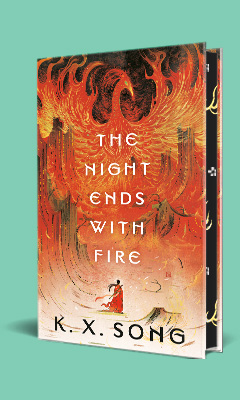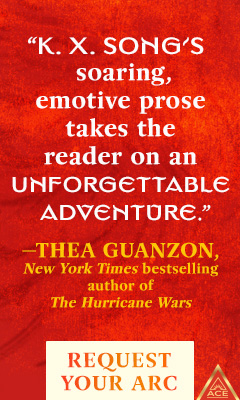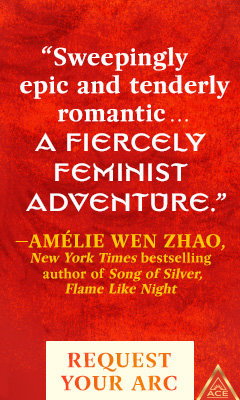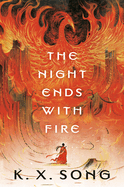The Night Ends with Fire
by K. X. Song
In K. X. Song's adult debut, The Night Ends with Fire--an action-packed fantasy reimagining of "The Ballad of Mulan" and Romance of the Three Kingdoms--an ambitious young woman enlists in the army to escape a bleak future. Hai Meilin's nobleman father is addicted to opium and has gambled away the family's fortune, plunging them into deep debt. Her stepmother and ally, Xiuying, has kept the household running so far by selling family treasures, but now they've reached a breaking point. Meilin will be sold off to whichever man will pay the most for a noble bride.
Meilin is matched with Master Zhu, a merchant whose previous wives allegedly died from consumption. Suspicious, she walks by his home and sees him viciously strike a servant girl, reminding her of the abuse she suffers at her father's hands. She sees clearly the future before her: "I would flee Father only to fall under another master. And even if I were to bear him a healthy son... that son would one day grow up to become a man, and then he too would command me... I would be under the whim of men for the rest of my days."
The kingdom of Anlai is at war to defend itself from the southern kingdom of Ximing, and Meilin sees a chance for freedom by pretending to be a bastard Hai son and enlisting in her father's place. Before she leaves, Xiuying gives her a jade pendant, one of four spirit seals, left to Meilin by the mother who drowned herself, with the instruction to "Give this to Meilin when she is ready to die." Soon the spirit of Qinglong, the Azure Dragon, begins whispering to her, urging her to use his power to secure her own. But using spirit magic is dangerous. The warlord who rules Anlai has outlawed all spirit worship, and the sea dragon's magic puts Meilin at risk of losing her moral compass and her life.
Meilin's other secret, that she is a woman, is even more dangerous. As she enters the world of men, she experiences freedom for the first time, even as her actions are dictated by her military superiors. Smaller and weaker than her male peers, Meilin trains harder than anyone else. She is placed under the command of handsome, honorable Prince Liu Sky, seventh and youngest son of the warlord. A chance encounter with him shortly before she enlists sparks an immediate attraction. Will he be able to see through her disguise?
At first, using the sea dragon's power is abhorrent to her, but as time passes she relies on and even relishes the control it gives her--over water, over battles, and over her opponents' very minds. Meilin's ambition, what Qinglong calls "an ocean's hunger," drives the story as much as the race to find the lost jade pieces of the phoenix Zhuque's broken spirit seal.
The search begins when Qinglong shows Meilin a vision of the future, one in which Chancellor Sima has destroyed not only the Anlai capital Chuang Ning but also Meilin's family, and sets her on a quest to find the remaining jade pieces--if she does, she can change the fate of the Three Kingdoms. Sima needs the pieces to destroy Anlai, while one of the Ximing princes, scheming, beautiful Ming Lei, also seeks the pieces for his own reasons. Meilin is pulled into Lei's household; hemmed in on all sides, she cannot free herself and save her family alone. Who can she trust? The sea dragon? The men with whom she is romantically connected? Her fellow soldiers? And what is she willing to give up for power?
Some characters and plot points are reminiscent of Disney's 1998 Mulan adaptation, such as an outdoor bathing scene in which Meilin's secret is almost discovered, and a budding romance with her dashing military commander. This is no humorous cartoon, however. The dragon spirit is greedy and encourages Meilin's darker impulses. Gender-based violence is prevalent, as is war violence. In one memorable scene, Chancellor Sima uses the phoenix Zhuque's fire powers to kill 10,000 Anlai soldiers, including almost all of Meilin's platoon. Song also builds something of a love triangle with two enemy princes, similar to the Romance of the Three Kingdoms, and casts her heroine not as the obedient daughter but as a morally gray young woman who will do whatever it takes to free herself from the life laid out for her.
The Night Ends with Fire blends historical fantasy with Wuxia martial drama and action into a compelling, complicated story of ambition, secrets and betrayal. The magic system is as fully realized as the political maneuverings of Song's characters, and the first-person perspective gives the book wide appeal, especially for readers aging out of the young adult fantasy genre. This epic adventure takes Meilin from her home in Anlai to the heart of Ximing and back, to palaces and battles, and to an ending that torments Meilin and readers. Song's audience will be eager to see how Meilin triumphs--and what that looks like--when Song concludes this planned duology. --Suzanne Krohn









